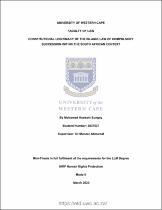Constitutional legitimacy of the Islamic law of compulsory succession within the South African context
Abstract
The Constitutional legitimacy of the Islamic Law of compulsory succession remains a
heavily contested issue since the enactment of the Constitution of the Republic of
South Africa, 1996 (hereafter the Constitution). South African law allows a deceased
person freedom of testation subject to common law and statutory limitations. This
freedom of testation principle is defined as the “[t]he right of an individual to dispose
of his or her property on death as he or she pleases”. Furthermore, the Supreme Court
of Appeal stated in the BoE Trust Ltd NO and Others case that this principle is perfectly
balanced against constitutional imperatives regarding non-discrimination and equality.
It was furthermore stated that this principle subtly forms part of section 25(1) of the
Constitution, in that it protects a person’s right to dispose of their assets, upon death,
as they wish.

